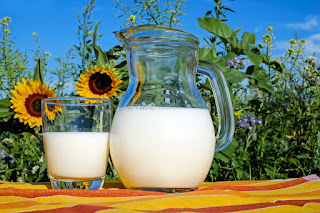Milk benefits for health
Milk benefits for health include providing essential nutrients such as calcium, protein, and vitamins. Additionally, milk is known to promote bone health and help prevent osteoporosis due to its high calcium content. It also supports muscle growth and repair, making it a great option for athletes and individuals looking to build strength.
The amount of calcium in milk varies depending on the type of milk. For example, one cup of cow's milk typically contains around 300 milligrams of calcium, which is about 30% of the recommended daily intake for adults. However, it's important to note that there are also non-dairy alternatives available, such as almond milk or soy milk, which may have different calcium content.
The amount of protein in milk varies as well. On average, one cup of cow's milk contains about 8 grams of protein, which is essential for muscle growth and repair. However, the protein content may differ in non-dairy alternatives like almond milk or soy milk. It's always recommended to check the nutrition labels for accurate information on protein content.
Vitamins in milk include vitamin D, which helps with calcium absorption and bone health. Milk is also a good source of vitamin B12, which is important for nerve function and the production of red blood cells. Additionally, milk contains small amounts of other vitamins, such as vitamin A, vitamin E, and vitamin K. However, the vitamin content may vary in non-dairy alternatives, so it's important to read the labels to ensure you are getting the vitamins you need.
Why milk is important for infants
Milk benefits for infants include providing essential nutrients for growth and development, such as protein and calcium. It also contains antibodies that help strengthen their immune system and protect against infections. However, it's important to note that infants should only consume breast milk or formula as their main source of nutrition until they are at least 1 year old, as cow's milk may not provide all the necessary nutrients for their age.
Why milk is beneficial for kids
Milk benefits for kids include providing a good source of vitamin D, which is essential for strong bones and teeth. Additionally, milk contains other important nutrients like potassium and phosphorus that support healthy growth and development in children. It is important to encourage children to consume milk as part of a balanced diet to ensure they receive these essential nutrients for their overall health.
Milk benefits for old age
Milk benefits for old age include providing a good source of calcium, which helps maintain bone density and reduces the risk of osteoporosis. Additionally, milk is rich in protein, which is important for muscle strength and repair in older adults. Consuming milk as part of a balanced diet can also help meet the increased nutrient needs that come with aging, such as vitamin B12 for nerve function and vitamin A for healthy vision. Incorporating milk into their diet can contribute to maintaining overall health and well-being in older individuals.
Which animal milk is best for health
There is no definitive answer as to which animal milk is best for health, as it depends on individual preferences and dietary needs. However, cow's milk is commonly consumed and widely available, making it a convenient choice for many people. It is important to note that different types of animal milk may vary in their nutrient composition, so it's advisable to consult with a healthcare professional or registered dietitian to determine the best option for your specific health goals.
Milk Recipe
The milk recipe for health includes incorporating low-fat or non-fat milk into your diet. This can be done by adding it to smoothies, oatmeal, or using it as a base for soups and sauces. Additionally, you can try alternatives like almond milk or soy milk if you have dietary restrictions or preferences. Experimenting with different milk options can help you find the one that suits your taste and health needs the best.
Banana milkshake
Banana milkshake benefits include being a good source of potassium, which can help regulate blood pressure and support heart health. It also provides essential vitamins and minerals, such as vitamin C and vitamin B6, which are important for immune function and energy production. Adding a banana milkshake to your diet can be a delicious and nutritious way to incorporate more fruits into your daily routine.
Apple milkshake
Apple milkshake benefits include being a great source of dietary fiber, which can aid in digestion and promote a healthy gut. Apples are also rich in antioxidants, such as flavonoids, which have been linked to reducing the risk of chronic diseases like heart disease and certain types of cancer. Incorporating an apple milkshake into your diet can be a refreshing and nutritious way to boost your overall health and well-being.
Date milkshake
Date milkshake benefits include being a natural energy booster due to their high sugar content, making them an excellent choice for a pre-workout drink. Dates are also packed with essential minerals like potassium, magnesium, and iron, which can help regulate blood pressure and improve overall cardiovascular health. Adding a date milkshake to your daily routine can provide you with a delicious and nutritious option to satisfy your sweet cravings while reaping the numerous health benefits they offer.
Strawberry milkshake
Strawberry milkshake benefits include being a good source of vitamin C, which can boost the immune system and promote healthy skin. Additionally, strawberries are rich in antioxidants that can help reduce inflammation and protect against chronic diseases. Adding a strawberry milkshake to your diet can be a refreshing way to incorporate these benefits into your daily routine.














No comments:
Post a Comment